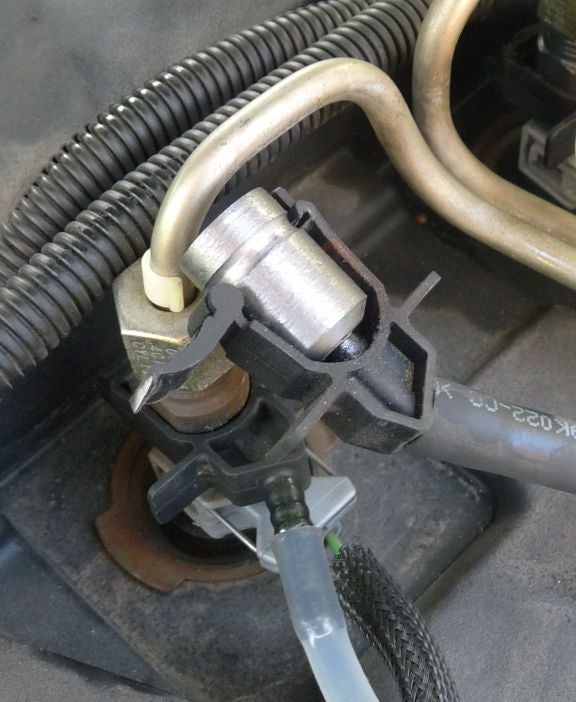Registrations
We now manually approve all new user accounts due to a large influx of spam bots. Accounts are normally approved within 48 hours.
If you need any help with using this Wiki, please ask here: TalkFord.com Wiki Submission Forum
Injector Leak-Off Test
|
Overview Guide | |
| Ford Model: | Mondeo_Mk3 |
|---|---|
| Petrol/Diesel: | Diesel |
| Estimated Cost: | ? |
| Difficulty? | Easy/Medium |
| How long does this take? | ? |
The Test Kit
To perform a leak-off test you will need a set of measuring bottles, 2 metres of tubing 3.2mm inside diameter, a set of leak-off connectors and four plugs with 7 mm entry holes.
I used four hair colouring bottles that are very cheap on eBay. Likewise the 3.2 mm tubing is also an eBay purchase as were the second hand leak-off connectors. The four plugs can be made simply by drilling a blind hole with a 7 mm drill into any hard material. Depth isn't critical but needs to permit the little O ring to enter. The material could be hard wood, plastic or in my case metal.
The Ford leak-off pipes are not quite as they appear. The black rubber outer conceals a hard plastic inner tube which is why the pipes are so rigid. I didn't think that I could pull the car's leak-off pipes off the connectors so I bought a scrap set and cut the pipes off these and then removed the outer rubber covering. You can see the inner hard plastic tube inside my clear plastic tubing in the photo below. (Alternatively, 7mm OD hose, such as 3.2x7mm silicone vacuum hose, will plug directly in to the injector holes).
Unplug the car's leak-off connectors and push your plugs (the shiney metal cylinder in my case) onto each one. (Alternatively, cocktail sticks with a couple of turns of PTFE tape can be used to plug the leak-off connector). If you don't plug these pipes then air will be drawn into the high pressure injection pump which will cause problems with running the engine for the test.
Then plug your connectors onto the injectors.
The hair colouring bottles come with tapered nozzles that you can cut the end off and push the clear plastic tubing onto them. It helps to mount the bottles on a metal strip just so that you don't get mixed up with the results.
The Test
The test that I used starts with 2 minutes running at idle followed by:
30 seconds with the accelerator held at 3800 rpm followed by:
30 seconds at idle followed by:
30 seconds with the accelerator held at 3800 rpm followed by:
30 seconds at idle followed by:
30 seconds with the accelerator held at 3800 rpm followed by:
30 seconds at idle.
Delphi state that the fuel temperature should be no less than 50C so hot engine for this test.
The Result
Good injectors should not leak more than 25ml in this test. Looking at my results from left to right the first one is an original factory fitted injector in this car and shows a good 20ml result. The second is an injector recently reconditioned by Swadincote Diesel and just passes the 25ml test. The next two show fail results of 30ml and 28ml respectively.
Leakage
Injectors can leak in two different ways. The Leak-Off Test above is measuring the leakage through the valve. Excessive leakage makes it impossible for the injection pump to achieve or maintain the pressure in the common rail that the ECU demands. When this happens the ECU will restrict performance or shut the engine down and record a DTC error such as P1211 indicating a failure to achieve correct pressure.
The other form of leakage is past the needle. In this case the fuel leaks into the cylinder when it shouldn't. The effect of this leakage is to cause firing too early or of greater magnitude than desired. The ECU will detect this when the knock sensor shows excessive knock. When this happens the engine will be put into limp mode and one or more of the following DTCs will be recorded.
P2336 Cylinder #1 Above Knock Threshold
P2337 Cylinder #2 Above Knock Threshold
P2338 Cylinder #3 Above Knock Threshold
P2339 Cylinder #4 Above Knock Threshold
If leakage of either type is caused by wear then the only cure is the replacement of the complete injector, however it is possible that leakage can be caused by carbon build-up at in the tip or by contamination by other forms of dirt, in this case it may be possible to repair the injector by cleaning. See: [TDCi Injector Cleaning] https://www.fordwiki.co.uk/index.php?title=Injector_Cleaning



 Your Privacy Choices
Your Privacy Choices